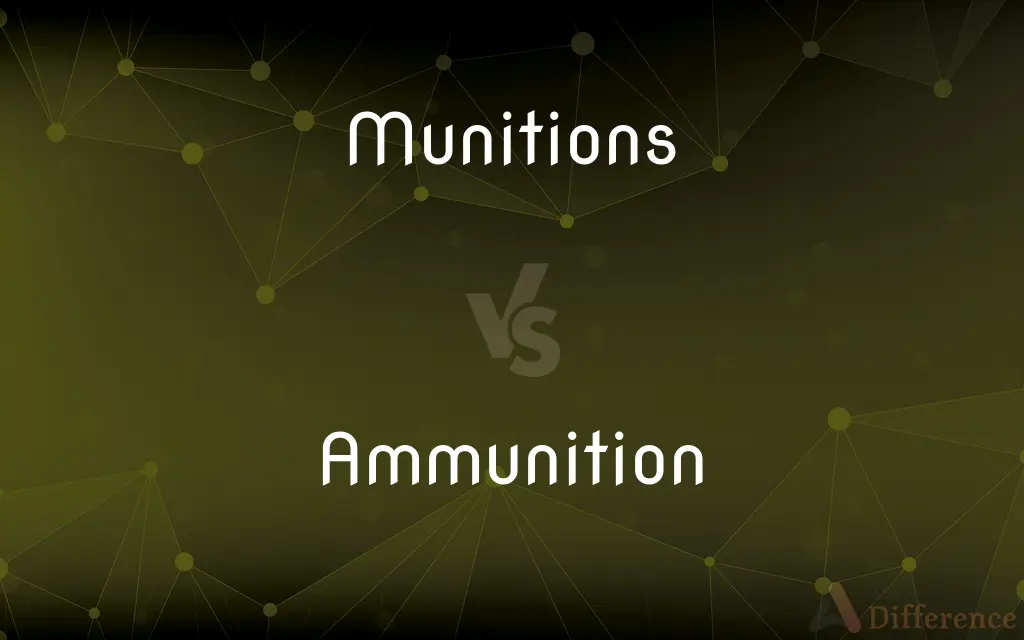Munitions vs. Ammunition — What's the Difference?
By Tayyaba Rehman & Fiza Rafique — Updated on February 29, 2024
Munitions encompass a wide range of military weapons and their components, whereas ammunition specifically refers to the materials used with weapons, like bullets and shells.

Difference Between Munitions and Ammunition
Table of Contents
ADVERTISEMENT
Key Differences
Munitions are a broad category that includes a wide array of military weapons, from guns and tanks to bombs and missiles, along with their associated equipment. Ammunition, on the other hand, is a subset of munitions, specifically focusing on the projectiles and propellants designed to be fired from weapons, such as bullets, shells, and other explosive charges.
Ammunition is an essential component of munitions, serving as the consumable elements fired by weapons, munitions also cover the platforms that deliver these projectiles, such as artillery pieces and missile launchers. This distinction highlights the broader scope of munitions compared to the more specific focus of ammunition on materials used for firing.
The production and supply chains for munitions and ammunition involve different levels of complexity. Munitions manufacturing encompasses the assembly of both the delivery systems and the ammunition itself, requiring a wide range of technological and engineering expertise. Ammunition production, while also complex, primarily focuses on the creation of projectiles and their propellants.
The term "munitions" can refer to the entire arsenal available for use in conflict, including both the delivery systems and the ammunition. In contrast, "ammunition" refers specifically to the stockpiling and distribution of the projectiles needed to sustain military operations.
The terminology used in military and defense contexts often reflects the distinction between these terms, with "munitions" representing the broader capabilities of a military force, including both offensive and defensive systems, while "ammunition" is more narrowly defined, emphasizing the consumable elements of warfare.
ADVERTISEMENT
Comparison Chart
Definition
Broad range of military weapons and equipment
Projectiles and propellants for weapons
Scope
Includes delivery systems and ammunition
Specifically refers to projectiles and explosives
Role in Warfare
Encompasses both offensive and defensive systems
Consumable elements fired by weapons
Production Complexity
High, involving diverse technologies
Focused on manufacturing projectiles and propellants
Military Logistics
Refers to the entire arsenal, including weapons and ammunition
Focuses on stockpiling and distribution of firing materials
Compare with Definitions
Munitions
Encompasses both offensive and defensive tools.
Anti-aircraft systems are part of the munitions inventory.
Ammunition
Manufactured for various weapons.
The factory produces ammunition for handguns and rifles.
Munitions
Military weapons and equipment.
The army deployed new munitions for the operation.
Ammunition
Materials fired from weapons.
The soldiers loaded their weapons with live ammunition.
Munitions
Includes ammunition as a component.
Munitions supplies were increased to include more ammunition.
Ammunition
Specific to projectiles and explosives.
Ammunition shortages can impact combat effectiveness.
Munitions
Integral to military capabilities.
Upgrading munitions enhances strategic defense potential.
Ammunition
Essential for offensive operations.
Strategic planning included an increase in ammunition production.
Munitions
Broad category including delivery systems.
Munitions development focuses on advanced missile technology.
Ammunition
Ammunition (informally ammo) is the material fired, scattered, dropped or detonated from any weapon or weapon system. Ammunition is both expendable weapons (e.g., bombs, missiles, grenades, land mines) and the component parts of other weapons that create the effect on a target (e.g., bullets and warheads).
Munitions
War materiel, especially weapons and ammunition.
Ammunition
Projectiles, such as bullets and shot, together with their fuses and primers, that can be fired from guns or otherwise propelled.
Munitions
To supply with munitions.
Ammunition
Nuclear, biological, chemical, or explosive materials, such as rockets or grenades, that are used as weapons.
Munitions
Plural of munition
Ammunition
Objects used as missiles in offense or defense
Rocks were my only ammunition against the bear.
Munitions
Military supplies
Ammunition
A means of attacking or defending an argument, thesis, or point of view.
Ammunition
Articles used in charging firearms and ordnance of all kinds; as powder, balls, shot, shells, percussion caps, rockets, etc.
Ammunition
(obsolete) Military stores, or provisions of all kinds for attack or defense.
Ammunition bread
Ammunition shoes
Ammunition
(figurative) Arguments and information that can be used against the other party in a conflict.
Ammunition
To supply with ammunition.
Ammunition
Military stores, or provisions of all kinds for attack or defense.
Ammunition
Articles used in charging firearms and ordnance of all kinds; as powder, balls, shot, shells, percussion caps, rockets, etc.
Ammunition
Any stock of missiles, literal or figurative.
Ammunition
To provide with ammunition.
Ammunition
Projectiles to be fired from a gun
Ammunition
Any nuclear or chemical or biological material that can be used as a weapon of mass destruction
Ammunition
Information that can be used to attack or defend a claim or argument or viewpoint;
His admission provided ammunition for his critics
Ammunition
Consumable elements in warfare.
Ammunition logistics are critical for sustained military operations.
Common Curiosities
Can the term munitions be used interchangeably with ammunition?
While related, they are not interchangeable; munitions cover a broader category including ammunition as a part.
What is considered ammunition?
Ammunition specifically includes the projectiles, such as bullets and shells, and their propellants, used with firearms and other weapons.
How do munitions differ from ammunition?
Munitions encompass both the weapons systems and the ammunition they use, while ammunition refers only to the consumable materials fired by these weapons.
What are munitions?
Munitions refer to a broad range of military weapons, equipment, and the associated ammunition used in warfare.
What role does ammunition play in military operations?
Ammunition is the consumable part of warfare, essential for offensive actions and defense through weapons systems.
What is the significance of ammunition in combat effectiveness?
Adequate and reliable ammunition is vital for maintaining combat effectiveness, impacting the outcome of military engagements.
How do military forces stockpile munitions?
Military forces stockpile munitions based on strategic needs, including both the weapons systems and ample ammunition for operations.
How does technology affect munitions development?
Advances in technology enhance munitions development, leading to more effective weapons systems and ammunition.
How do international laws affect munitions trade?
International laws and treaties regulate the trade of munitions and ammunition to prevent proliferation and ensure global security.
Why is the distinction between munitions and ammunition important?
The distinction is crucial for understanding military logistics, planning, and the specific roles of different military assets.
How are munitions and ammunition produced?
Munitions production involves manufacturing both the delivery systems (like guns and missiles) and the ammunition, requiring diverse technological expertise.
What safety considerations are there for handling munitions?
Handling munitions requires strict safety protocols to prevent accidents, given the explosive nature of many components.
Can civilian sectors access munitions and ammunition?
Access to munitions and ammunition by civilians is heavily regulated, with specific laws governing their use and ownership.
What impact do munitions have on modern warfare?
Munitions, through advanced weapons systems and effective ammunition, significantly impact the strategies and outcomes of modern warfare.
What challenges are involved in ammunition logistics?
Ammunition logistics include the storage, handling, and distribution of projectiles and explosives, crucial for maintaining combat readiness.
Share Your Discovery

Previous Comparison
Pneumonia vs. Tuberculosis
Next Comparison
Royalty vs. NobilityAuthor Spotlight
Written by
Tayyaba RehmanTayyaba Rehman is a distinguished writer, currently serving as a primary contributor to askdifference.com. As a researcher in semantics and etymology, Tayyaba's passion for the complexity of languages and their distinctions has found a perfect home on the platform. Tayyaba delves into the intricacies of language, distinguishing between commonly confused words and phrases, thereby providing clarity for readers worldwide.
Co-written by
Fiza RafiqueFiza Rafique is a skilled content writer at AskDifference.com, where she meticulously refines and enhances written pieces. Drawing from her vast editorial expertise, Fiza ensures clarity, accuracy, and precision in every article. Passionate about language, she continually seeks to elevate the quality of content for readers worldwide.














































